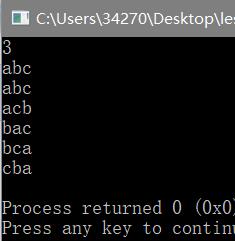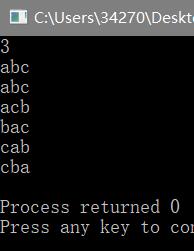根据入栈求出栈、根据出栈求入栈
一. 给定一个入栈顺序,输出所有出栈顺序。
我的做法是将入栈序列全排列,筛选出满足出栈要求的序列,如何判断是否满足要求呢?
用数组out来记录需要判断是否满足要求的序列,数组enter记录入栈序列,用一个栈来模拟元素的入栈和出栈。如果栈顶和out对应位置元素相等就删除栈顶元素,否则将enter中的元素入栈,最后栈不为空就说明不满足要求。
#include <bits/stdc++.h> using namespace std; stack<char>S; int n; char enter[15], out[15]; bool ok(char *out) { stack<char>S; S.push(enter[0]); int j = 1, i = 0; while(i<n) { if(j<n&&S.top()!=out[i]) { S.push(enter[j++]); } else if(S.top() == out[i]) { S.pop(); i++; } else if(j==n&&!S.empty()) return 0; } return 1; } int main() { cin>>n; cin>>enter; strcpy(out, enter); sort(out, out+n); do { if(ok(out)) puts(out); } while(next_permutation(out, out+n)); return 0; }
样例:

二. 给定一个出栈顺序,输出所有可能的入栈顺序。
思路跟上面的一样,只不过将将全排列的对象改为enter,函数内容不变。
#include <bits/stdc++.h> using namespace std; stack<char>S; int n; char enter[15], out[15]; bool ok(char *enter) { stack<char>S; S.push(enter[0]); int j = 1, i = 0; while(i<n) { if(j<n&&S.top()!=out[i]) { S.push(enter[j++]); } else if(S.top() == out[i]) { S.pop(); i++; } else if(j==n&&!S.empty()) return 0; } return 1; } int main() { cin>>n; cin>>out; strcpy(enter, out); sort(enter, enter+n); do { if(ok(enter)) puts(enter); } while(next_permutation(enter, enter+n)); return 0; }
样例



